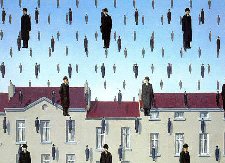Gmail added another “much-needed” feature we all were starving to see:
How often do you try to chat with somebody and they don’t respond because they just walked away from their computer? Or maybe you’re in the middle of chatting with them just as they need to leave. But you still need to tell them something – something really important like you’ve moved, where you’re meeting…or ice cream! We need ice cream! This is why we built a way to chat with your friends even when they’re away from their computers. Now you can keep the conversations going with a new Labs feature that lets you send SMS text messages right from Gmail. It combines the best parts of IM and texting: you chat from the comfort of your computer, and your friends can peck out replies on their little keyboards.
This will be a panacea for anxious people who can’t detach themselves from the people whom they chat with and need to keep the umbilical cord always connected. It will also be a nightmare for people who still think that you can go to the toilet and indulge in free-roaming philosophical thoughts stimulated by the movements deep inside the body instead of by Google search.
Of course, people can block or stop the SMS messages at any time, but the silence of becoming isolated from the Net could become too eerie to bear. The pressures of the unknown neglected inner self asking for attention will probably be pacified again with some gadget connected to the big mama-net with its sweet bytes flowing down reminding us that we aren’t isolated anymore.
[/en][it]
Gmail ha aggiunto un’altra opzione “veramente necessaria” che tutti noi stavamo aspettando con impazienza:
Ti capita spesso di chattare con qualcuno e non risponde perché si è appena allontanato dal computer? Oppure sei in mezzo alla chat e deve andarsene? Ma devi ancora dire qualcosa – qualcosa di molto importante tipo che hai traslocato, dove vi troverete oppure… il gelato! Abbiamo bisogno di gelati! Ecco perché abbiamo progettato un modo per farti chattare con i tuoi amici anche quando sono lontani dal loro computer. Ora puoi mantenere la conversazione attiva con una nuova caratteristica creata nei Labs che ti consente di mandare dei messaggi SMS direttamente da Gmail. Combina la parte migliore dell’Instant Messaging e dei messaggi SMS: chatti comodamente dal tuo computer e i tuoi amici possono mandare le loro repliche dalle loro piccole tastiere.
Questa sarà una panacea per gli ansiosi che non possono distaccarsi dalle persone con cui chattano e necessitano di mantenere il cordone ombelicale sempre connesso. Sarà anche un incubo per le persone che credono che possono andare in bagno e abbandonarsi ai pensieri filosofici in serendipità stimolati dai movimenti profondi che avvengono nel corpo invece che dalle ricerche di Google.
Naturalmente, le persone possono bloccare o fermare i messaggi SMS in ogni momento, ma il silenzio dell’essere isolati dalla rete potrebbe diventare troppo inquietante da sopportare. La pressione del proprio sé trascurato e sconosciuto, che chiede attenzione, verrà probabilmente sedato di nuovo da qualche gadget connesso alla grande madre delle Rete che con i suoi dolci byte ci ricorderà che non siamo più isolati.
[/it]


